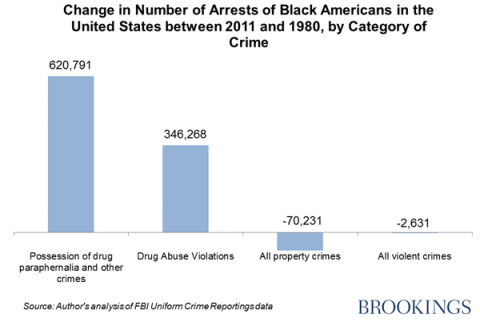The social mobility of black Americans has suffered collateral damage from the “War on Drugs.” Being convicted of a crime has devastating effects on the employment prospects and incomes of ex-felons and their children, as my Brookings colleagues and other scholars have found. These findings are often used to motivate efforts to reduce criminal behavior. They should also motivate changes in our criminal justice system, which unfairly punishes black Americans—often for victimless crimes that whites are at least as likely to commit.
Imprisoning One in Three Black Men
An estimated one-third of black male Americans will spend time in state or federal prison at some point in their lifetime – more than double the rate from the 1970s and over five times higher than the rate for white males.
What’s driving the imprisonment of black men? Arrest data show a striking trend: arrests of blacks have fallen for violent and property crimes, but soared for drug related crimes. As of 2011, drug crimes comprised 14 percent of all arrests and a miscellaneous category that includes “drug paraphernalia” possession comprised an additional 31 percent of all arrests. Just 6 percent and 14 percent of arrests were for violent and property crimes, respectively.
Drug Crimes Driving Black Incarceration…
The black share of people arrested for drug offenses has ranged from 23 percent (in 1980) to 41 percent (in 1991). Blacks remain far more likely than whites to be arrested for selling drugs (3.6 times more likely) or possessing drugs (2.5 times more likely).
…Even Though Whites Are Equally Likely to Sell and Use Drugs
Here’s the real shock: whites are actually more likely than blacks to sell drugs and about as likely to consume them.
Whites were about 45 percent more likely than blacks to sell drugs in 1980, according to an analysis of the National Longitudinal Survey of Youth by economist Robert Fairlie. This was consistent with a 1989 survey of youth in Boston. My own analysis of data from the 2012 National Survey on Drug Use and Health shows that 6.6 percent of white adolescents and young adults (aged 12 to 25) sold drugs, compared to just 5.0 percent of blacks (a 32 percent difference).
As for drug use, just 10 percent of blacks report using illegal drugs within the last month, which is not statistically different than the rate for whites. Among college students, 25 percent of whites reported illegal drug use within the last month but just 20 percent of black students. I find a higher percentage of whites than blacks report ever consuming illegal drugs.
Drug-Related Incarceration Damages Upward Mobility
In her new book, legal scholar Michelle Alexander offers a thorough examination of the relationship between law, policing and race. It is a complex story. But one thing is clear. The drug war has a profoundly negative effect on racial equality, and on rates of upward mobility.
-------------------
Jonathan Rothwell is a fellow at the Metropolitan Policy Program at Brookings. His research focuses on labor market economics, social mobility, access to education, and the sources of economic growth. His Brookings publications have included reports on hard-to-fill job vacancies, the value of STEM knowledge, skill mismatch, the role of inventive activity on regional growth, and the causes and consequences of school segregation.


Spread the word